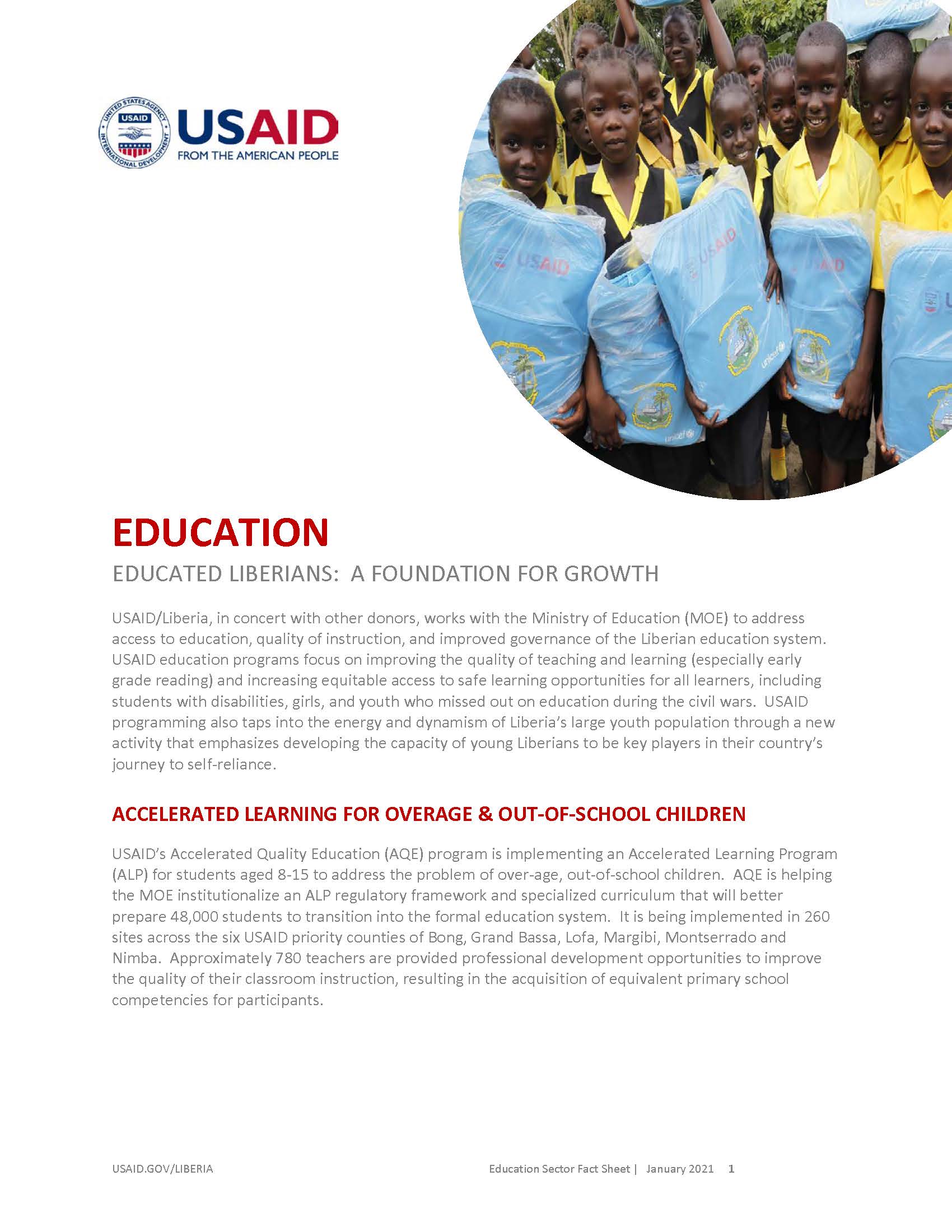Speeches Shim
Education ![]() (pdf - 203k)
(pdf - 203k)
USAID/Liberia, in concert with other donors, works with the Ministry of Education (MOE) to address access to education, quality of instruction, and improved governance of the Liberian education system. USAID education programs focus on improving the quality of teaching and learning (especially early grade reading) and increasing equitable access to safe learning opportunities for all learners, including students with disabilities, girls, and youth who missed out on education during the civil wars. USAID programming also taps into the energy and dynamism of Liberia’s large youth population through a new activity that emphasizes developing the capacity of young Liberians to be key players in their country’s journey to self-reliance.
ACCELERATED LEARNING FOR OVERAGE & OUT-OF-SCHOOL CHILDREN
USAID’s Accelerated Quality Education (AQE) program is implementing an Accelerated Learning Program (ALP) for students aged 8-15 to address the problem of over-age, out-of-school children. AQE is helping the MOE institutionalize an ALP regulatory framework and specialized curriculum that will better prepare 48,000 students to transition into the formal education system. It is being implemented in 260 sites across the six USAID priority counties of Bong, Grand Bassa, Lofa, Margibi, Montserrado and Nimba. Approximately 780 teachers are provided professional development opportunities to improve the quality of their classroom instruction, resulting in the acquisition of equivalent primary school competencies for participants.
EARLY GRADE READING SUPPORT
In line with USAID global education priorities to strengthen early grade reading, the Read Liberia activity supports learners in grades one and two by pilot testing innovative literacy skills development programs for students in public kindergarten schools in the six priority counties. The goal of this activity is to ensure that after two years of schooling, grades one and two public school students will read and understand grade level text in English and pre-primary students will develop the oral vocabulary lexicon required for their expanding literacy skills. Approximately 5,400 public school kindergarteners and 172,800 first and second grade public school students will participate in this activity.
SCHOOL FEEDING PROGRAM SUPPORT II
USAID is implementing a School Feeding Program to provide food to 11,450 children in 28 USAID-supported schools in Bong County. The activity supports school feeding in pre-primary, primary, and secondary schools to address chronic classroom hunger. Providing targeted schools with daily meals ensures better attendance and focus on the lessons which improves students’ chances to achieve their educational goals and a brighter future. The activity is contributing to Liberia’s national goal of increasing access to education for all children, reducing hunger for children who attend school, improving children’s well being, and increasing community support for education. The activity works with, and through, school feeding committees made up of parents, teachers, and volunteers who manage the activity locally. They prepare and serve hot meals to the learners, resolve any issues that arise, and promote school feeding within the community.
PREPARING THE NEXT GENERATION OF LIBERIAN CIVIL SERVICE LEADERS
USAID is implementing the President’s Young Professionals Program (PYPP) to help prepare the next generation of Liberia’s civil service leaders. PYPP supports a cohort (Class IX) of 20 young, talented Liberian college graduates who have been placed in government ministries, national agencies, and private sector institutions on a 2-year fellowship. The activity balances the government’s immediate need for competent junior staff with the longer-term goals of increasing the capacity of the civil service and preparing a new generation of talented youth for leadership roles in government. PYPP recruits, places, trains, and mentors the participants, and is also piloting greater private sector engagement by placing some of its Class IX Fellows in private sector organizations. With both public and private placements, this activity is developing a new generation of professionals who will enhance private sector investment, increase quality service delivery, and instill sustainable good governance practices in their hosting institutions.


Comment
Make a general inquiry or suggest an improvement.